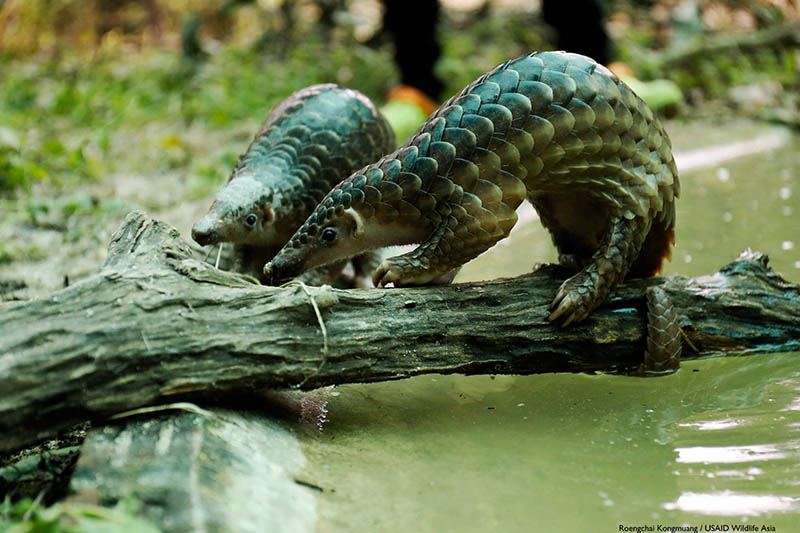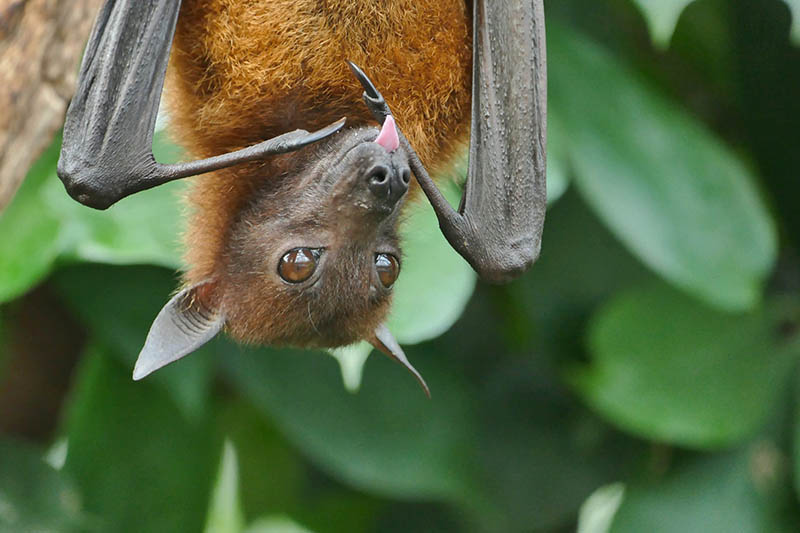Top: Bats are considered a high-risk species for emerging diseases. Photo: Freeland
Vietnam’s recent ban on the import and sales of wildlife and wildlife products to curb the onset of further disease outbreaks has raised the question of whether Thailand should follow suit. Steven Galster of Bangkok based anti-trafficking group Freeland thinks it should.
Here’s the lowdown: With wild animals smuggled through Bangkok’s Khlong Toei port, sold at Chatuchak Weekend Market and exported for sale onward; Thailand is a nexus for the global wildlife trade, and Galster thinks a law far stronger than Vietnam’s may protect us from the next viral disaster.
“Banning this trade would drastically reduce the chance of another pandemic,” Galster told Coconuts Bangkok, emphasizing that the aim is not to penalize people who hunt to feed their families but stop the profit-driven trade in animals and their parts to safeguard public health.
Thailand is a hub for trading wild animals with most of the “goods” moving onto places like China and Vietnam. Species and products involved range from the perfectly legal to the illicit trade of live orangutans or tusks of dead elephants.
His group, Freeland, operates on four continents to shape government policy and prosecute wrongdoers and so protect both humans and animals from greed, corruption and organized crime. Last month it signed onto the global #endpandemics campaign.

How trafficking creates outbreaks
“The commercial wild animal trade sits alongside habitat destruction as a key cause of new disease outbreaks,” Galster said. Wild habitat is destroyed to make way for industrial farming, increasing contact between domestic animals such as pigs and wild animals to spread new infections.
“Habitats should be protected but banning commercial trade in wild animals would make it far less likely for diseases to spread,” said the environmental investigator with nearly three decades experience.

Galster revealed multiple entry points for wildlife arriving in Thailand from overseas. For example, smuggling occurs through large shipping ports such as Bangkok’s Khlong Toei – a place so busy that it’s difficult to monitor and police. Wildlife products arrive overland, too. Body parts, such as tiger bones and rhino horns destined for “traditional” Chinese medicine, are sometimes hidden on commercial flights.
“Of all new and emerging human infectious diseases, some 75 per cent ‘jump species’ from animals to people,” the United Nations Environment Programme recently reported. COVID-19 is only the latest in a series of diseases to do this.
Described as zoonotic diseases by scientists, well-known examples include the deadly Ebola virus, which jumped to people from African fruit bats via apes and monkeys back in 1976; and the pneumonia-like SARS, which was originally discovered in Southern China in horseshoe bats and moved to civet cats and then humans in 2003.
Today’s coronavirus probably started in bats too; with pangolins potentially the hosts in between, though the science is still inconclusive.
“Whether or not we find out exactly which animal it came from and how, both animals carry a version of the virus,” Galster said.
Thai loophole breeds pandemic risk
Commercial captive breeding, which is legal, helps mask the illegal trade.
“Thailand has many animal breeding facilities – some are perfectly legal – but others, sometimes presenting themselves as private zoos, are covers for illegal trade,” Galster said. “In the recent past, traders who managed to smuggle something illegal in weren’t punished by Thai law for selling it on – provided they could show a license saying it was bred here.”
The law long failed to prevent many internationally protected animals from being traded in the kingdom. There is also a long list of species, from South American rodents (capybaras) to flying possums (called sugar gliders) from New Guinea and Australia, which can be legally bred in Thailand.
Galster said that unscrupulous breeding outfits launder illegally imported animals by claiming they were bred domestically. This leads to species from elsewhere mixing with locally reared animals, increasing the risk of viruses spreading.
This year the law was upgraded.
“Now if you are caught selling a species protected internationally and don’t have the right paperwork, you can be arrested and penalized,” Galster said.
Seeing this as a positive, he noted that a criminal trader can still falsely claim the animal was bred here. It’s difficult for law enforcement to determine the truth.
Fears over lawful and unlawful trade
The illegal wildlife trade is ranked as the fourth most serious organized crime in the world, after drugs, counterfeiting, and human trafficking according to Traffic, a global network monitoring the wildlife trade.
In 2018, Thai authorities arrested Boonchai Bach in connection with the illegal import of 14 rhino horns from Africa. He was suspected of heading up a vast syndicate trafficking poached elephant ivory, rhino horn, pangolins, tigers, lions, and other endangered species.
Bach was acquitted due, Galster said, to a weak prosecution case which called only a single witness and excluded mountains of additional evidence in possession of Thai and international agencies and NGOs.
For Galster, transnational criminals hold the door open for the spread of new viruses. But even the legal trade in wild animals can cause problems for disease control. In February 2020, a horse died for the first time in Thailand from a virus called African Horse Sickness.
As the country locked-down for COVID-19, the equine contagion spread. Leaving humans unaffected; the disease spreads through horse, mule, donkey and zebra populations by blood sucking midges and certain mosquitoes. It killed nearly 550 horses before Thai authorities brought it under control.
Experts identified an imported batch of zebras (likely destined for sale to Chinese safari parks and probably carrying some kind of horsefly) as the outbreak’s source. The government has now banned the import and export of zebras and related animals.
The story highlights the difficulties with legal wild animal trading. Galster points out that African Horse Sickness would not have arrived if the zebras had not been brought in.
What about Chatuchak’s pet market?
A ban would affect the exotic pet section of Bangkok’s Chutuchak Market, where exotic animals are sold as pets and even bred. Galster’s seen it all there. Snakes, turtles and tortoises from Asia and the horn of Africa, alongside everything from sub-Saharan serval cats and feral ferrets from Myanmar to iguanas and even vultures.
“Some animals are from wildlife farms outside Bangkok, and some come straight from the wild. It’s hard to tell what’s farmed or smuggled in. Everything is in close proximity. Dealers wear face masks and offer hand-gel, but at any time infections could be spread amongst the animals they sell,” Galster said of the popular tourist destination.
Asked whether a ban would destroy the livelihoods of legal, registered traders (like those in Chatuchak) Galster suggests some of the money earmarked for post-virus economic recovery be used to compensate them and help them establish new businesses.
A ban the best plan?
Not everyone agrees with Freeland and backs a blanket ban. Richard Thomas, spokesman for trade monitoring group Traffic, says total bans are a knee-jerk reaction that are extremely difficult to implement and enforce. He cites the drug trade as an example.
“If the underlying demand persists, it’ll be supplied,” Thomas said.
Big players like the UN Environment Programme, or UNEP, agree. Recognizing in a recent report that the consumption, handling and trading of wildlife can be a factor in zoonotic disease transmission, the UNEP looks to governments to manage things better – rather than enforce a total ban.
UNEP suggests targeting specific high-risk species based on evidence such measures would be effective in stopping the spread of disease.
“Particular animals (like bats) might be too risky for human consumption, and trade should be strongly discouraged,” Thomas added.
He said action should be based on best outcomes.
“We need to understand where and how disease spillovers occur. This isn’t limited to wild animals; domestic animals have been implicated in outbreaks too,” he said. “Is it really safer to transport 100 domestic pigs in small cages than sell a few deer at a local market?”
Galster defended the need for a ban as necessary in the face of the present global crisis.
He described such a ban as “an insurance policy against another Covid 19-like disaster,” saying it would mean fewer traders willing to break the law by doing business and fewer customers interested in taking the risk.
It would also “restrict the flow and volume of trade so that fewer animals and fewer pathogens move about,” he said.
What next?
Having spoken to advisors in Thailand’s public health and environment ministries, Galster is confident they are interested and says talks are ongoing. Meanwhile, many are working to better regulate the trade and enforce the laws.
Whatever the government decides to do, our current situation dictates that it take seriously the link between our commercial use of animals and the emergence of future pandemics. As society gears up to “build back better,” the deeper point remains: safeguarding our own health means rethinking our relationships with our fellow species.



Reader Interactions